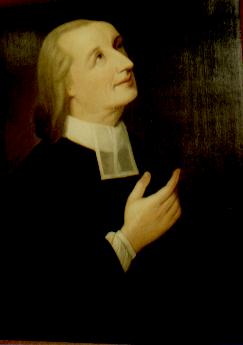Wesley and the Pentecostals

John Fletcher
As a result of Fletcher’s influence, Wesley’s latter sermons “highlighted the Methodist phenomenon as inaugurating a “Pentecostal Church’ in the world.”5 The distinct contribution that Fletcher made upon Wesley’s theology was the concept of a “Pentecostal Church,” which helped Wesley articulate and defend the extraordinary work of God that was happening through the Methodist movement. Wood notes that Wesley’s latter sermons focused on a Pentecostal theme because he believed that the Methodist revival in his day was the first sign of a new Pentecost. He believed that a new Pentecostal Church was being re-established on the earth that would be the fulfillment of the first Pentecost.6 The external evidence of the outward work of the Spirit resembled the first Pentecost and demonstrated that God was indeed with the Methodists as they spread universally throughout the world. Wesley’s concept of a “Pentecostal Church” demonstrates a growing interest in the universal work of the Spirit and marks a further shift in Wesley’s doctrine of the Holy Spirit.
Fletcher helped Wesley articulate and defend the extraordinary work of God that was happening through the Methodist movement.
Holiness Movement
Both Wesley and Fletcher’s writings were widely spread among early Methodists and became distributed widely in the later Holiness movement. The Holiness Movement of the 1800’s served as the major catalyst for the spread of the doctrine of entire sanctification. The Movement emphasized sanctification as a second definite work of grace, which is distinct from salvation. Various terms were used to describe this experience beyond conversion including, “Christian perfection,” “entire sanctification,” “second blessing,” and “higher Christian life.”
Wesley believed that a new Pentecostal Church was being re-established on the earth that would be the fulfillment of the first Pentecost.
Fletcher used Pentecostal language to describe the Spirit’s work with phrases such as ‘baptized with the Spirit’ and ‘filled with the Spirit.’
Revivalist Charles Finney was a powerful preacher and teacher in the mid 1800’s. He was practicing law when he experienced a dramatic conversion, after which he gave up everything to pursue the call to preach. Finney soon emerged as the new leader of evangelical revivalism. His revivals burned through major urban areas like Philadelphia, New York City, Boston, and Rochester. His fame brought him international attention, which eventually took him to England.
Wesley believed that the Methodist revival in his day was the first sign of a new Pentecost.
Category: Church History, Summer 2006


